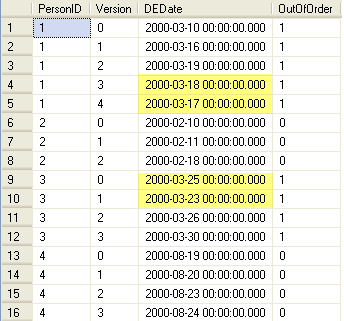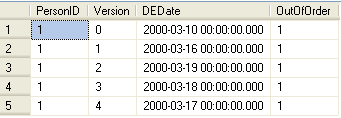Let’s say I have table in which there are three fields:
Data Entry Date’s for all versions of a particular PersonID should be compared in in such a way that the succeeding version’s Data Entry Date should be greater than its preceding version’s Data Entry Date. If the records are stored correctly, then that PersonID’s version is said to be in proper order, otherwise it is said to be in an improper order.
I have tried lots of ways to tackle this problem, using cursors, loops, subqueries, etc... , but the best solution I have found is by using CROSS JOINS.
The following script will help you understanding the problem and its solution. I am creating a new table, adding some data and then using the query to determine which records are out of order.
In the output it will display all the records with a flag called OutOfOrder. If the flag is 1 that means there is a problem with the record order. Otherwise, the PersonID’s versions are in proper order.
In this example we can see that PersonID 1 has two records that are out of order. The 2003-03-18 record came before the 2008-03-17 record, so the query picked these up as being out of order. Also, for PersonID 3 the 2000-03-25 record came before the 2000-03-23 record, so again these are out of order.

So, instead of using loops and cursors to determine if there is an issue it handles everything in a single query.
In this next example we are looking at just one record (PersonID =1) and we can also see the execution plan that is generated.


- PersonID
- Version
- DEDate (date entry date)
Data Entry Date’s for all versions of a particular PersonID should be compared in in such a way that the succeeding version’s Data Entry Date should be greater than its preceding version’s Data Entry Date. If the records are stored correctly, then that PersonID’s version is said to be in proper order, otherwise it is said to be in an improper order.
I have tried lots of ways to tackle this problem, using cursors, loops, subqueries, etc... , but the best solution I have found is by using CROSS JOINS.
The following script will help you understanding the problem and its solution. I am creating a new table, adding some data and then using the query to determine which records are out of order.
CREATE TABLE [dbo].[Person](
[PersonID] [int] NOT NULL,
[Version] [int] NOT NULL,
[DEDate] [datetime] NULL,
CONSTRAINT [PK_Person] PRIMARY KEY CLUSTERED
(
[PersonID] ASC,
[Version] ASC
))
GO
INSERT INTO Person VALUES(1,0,'03/10/2000')
INSERT INTO Person VALUES(1,1,'03/16/2000')
INSERT INTO Person VALUES(1,2,'03/19/2000')
INSERT INTO Person VALUES(1,3,'03/18/2000')
INSERT INTO Person VALUES(1,4,'03/17/2000')
INSERT INTO Person VALUES(2,0,'02/10/2000')
INSERT INTO Person VALUES(2,1,'02/11/2000')
INSERT INTO Person VALUES(2,2,'02/18/2000')
INSERT INTO Person VALUES(3,0,'03/25/2000')
INSERT INTO Person VALUES(3,1,'03/23/2000')
INSERT INTO Person VALUES(3,2,'03/26/2000')
INSERT INTO Person VALUES(3,3,'03/30/2000')
INSERT INTO Person VALUES(4,0,'08/19/2000')
INSERT INTO Person VALUES(4,1,'08/20/2000')
INSERT INTO Person VALUES(4,2,'08/23/2000')
INSERT INTO Person VALUES(4,3,'08/24/2000')
GO
SELECT *,
(SELECT
CASE WHEN (SUM(CASE WHEN B.DEDate<C.DEDate THEN 0
ELSE 1
END))>=1 THEN 1
ELSE 0
END AS IsNotProper
FROM Person2 B CROSS JOIN
Person2 C
WHERE B.PersonID=A.PersonID
AND C.PersonID=A.PersonID
AND B.Version<>C.Version
AND B.Version<C.Version)
AS [OutOfOrder]
FROM Person2 A |
In the output it will display all the records with a flag called OutOfOrder. If the flag is 1 that means there is a problem with the record order. Otherwise, the PersonID’s versions are in proper order.
In this example we can see that PersonID 1 has two records that are out of order. The 2003-03-18 record came before the 2008-03-17 record, so the query picked these up as being out of order. Also, for PersonID 3 the 2000-03-25 record came before the 2000-03-23 record, so again these are out of order.

So, instead of using loops and cursors to determine if there is an issue it handles everything in a single query.
In this next example we are looking at just one record (PersonID =1) and we can also see the execution plan that is generated.
SELECT *,
(SELECT
CASE WHEN (SUM(CASE WHEN B.DEDate<C.DEDate THEN 0
ELSE 1
END))>=1 THEN 1
ELSE 0
END AS IsNotProper
FROM Person2 B CROSS JOIN
Person2 C
WHERE B.PersonID=A.PersonID
AND C.PersonID=A.PersonID
AND B.Version<>C.Version
AND B.Version<C.Version)
AS [OutOfOrder]
FROM Person2 A
WHERE A.PersonID = 1 |
Query Output

Statistics I/O
| (5 row(s) affected) Table 'Worktable'. Scan count 1, logical reads 0, physical reads 0, read-ahead reads 0, lob logical reads 0, lob physical reads 0, lob read-ahead reads 0. Table 'Person'. Scan count 7, logical reads 14, physical reads 0, read-ahead reads 0, lob logical reads 0, lob physical reads 0, lob read-ahead reads 0. |
Execution Plan

No comments:
Post a Comment